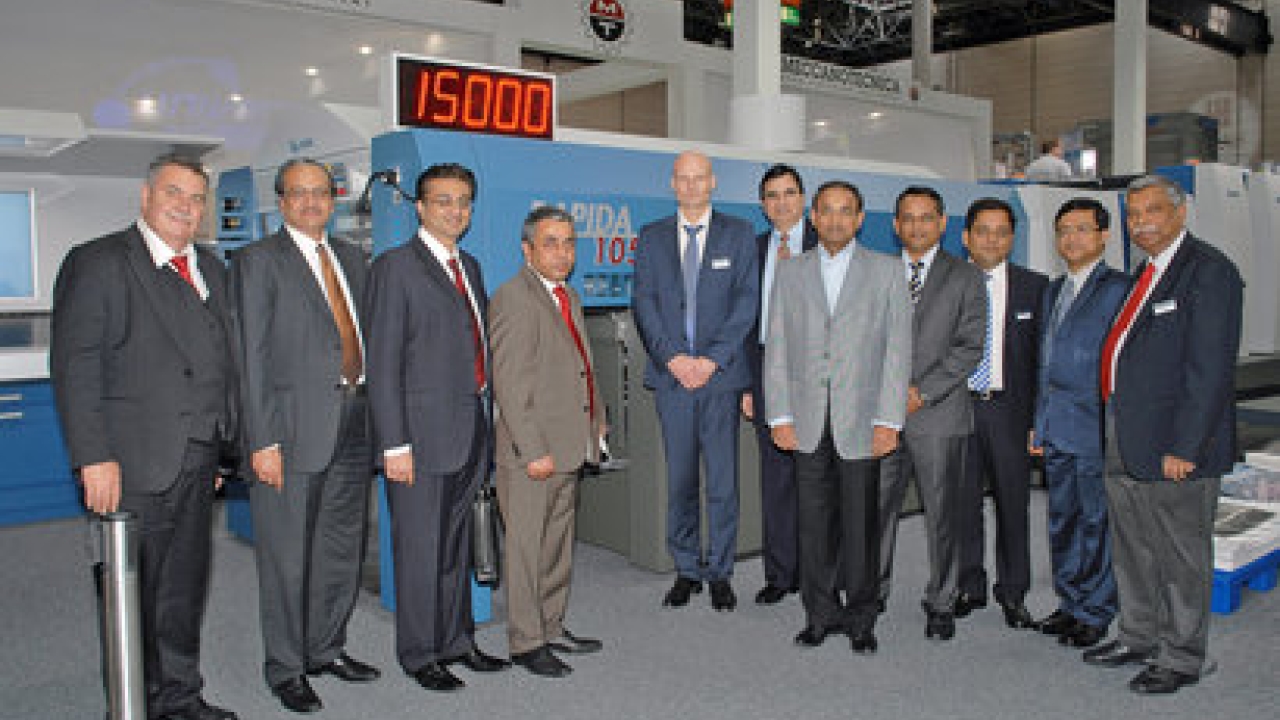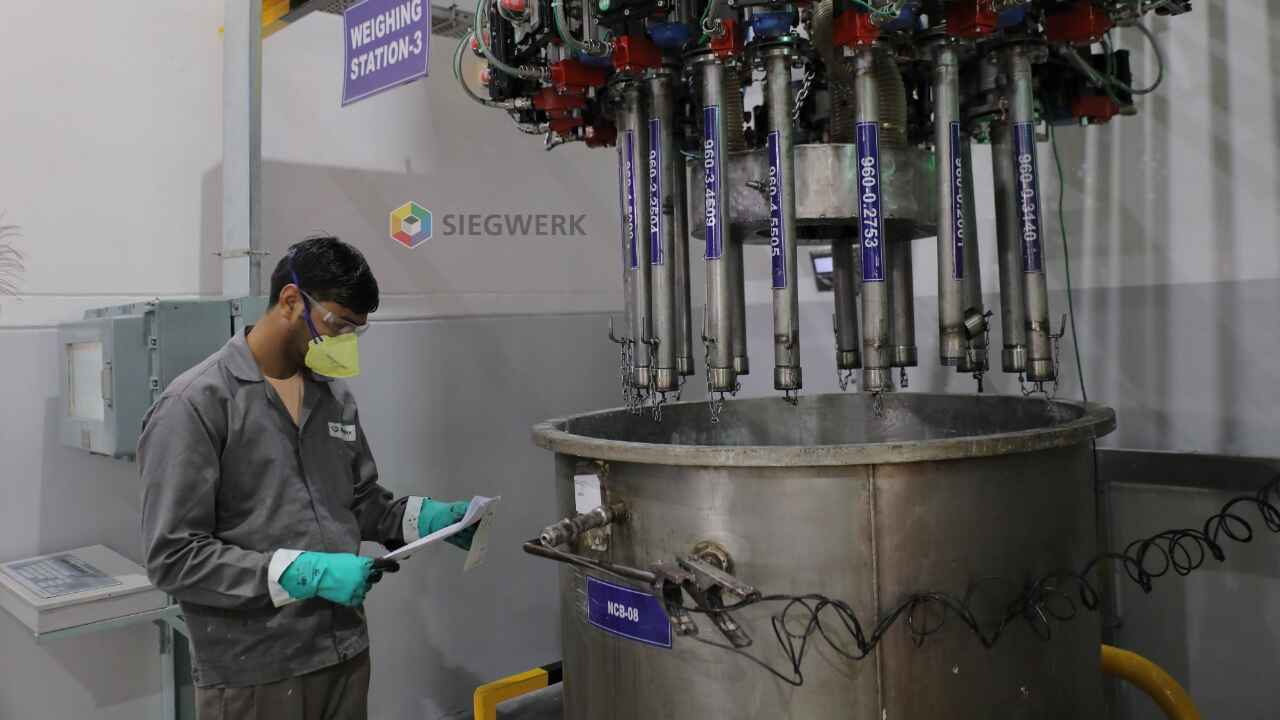KBA reports success with Indian package printers

- Sales of second-hand, less automated presses to India's package printing community making way for investment in cutting-edge technology according to German press manufacturer
- Rapida 105 and 106 installations in 2012 to be followed by further shipments of presses to India in 2013
German press manufacturer Koenig & Bauer (KBA) is claiming that the time when Indian packaging printers invested predominantly in second-hand and less automated sheet-fed offset presses is coming to an end, after delivering new Rapida press models to three such companies in recent months.
The installations have included medium format sheet-fed offset presses from KBA, among them two high-end Rapida 106s.
KBA said the Indian market is focusing increasingly on technology and is characterized by its awareness of quality, which is based on the global market. The recent Labelexpo India event highlighted how the country is looking to invest in new technologies to help them innovate and grow their businesses.
Changes to retail FDI, permitting foreign firms to open multi-brand retail outlets on their own, are helping grow this desire for the latest package and label printing technology.
TCPL Packaging
KBA has recently installed a Rapida 106 with a Corona unit, six printing units, coater and double-delivery extension at TCPL Packaging in Haridwar.
 Pictured above are the TCPL's press operators with the commissioning team from IPM and KBA in front of the new press
Pictured above are the TCPL's press operators with the commissioning team from IPM and KBA in front of the new press
TCPL currently owns four production plants – three in Silvassa in western India and one in Haridwar, near the city of Delhi. Every plant is DISO 9001:2008 and ISO 22000:2005 accredited and follows strict standards set for vendors of food packaging (BRC/IOP). Additionally, the plants in Silvassa are certified to the FSC standard to promote responsible forest management.
Alongside the production of packaging for food, spirits and cigarettes, plus folding boxes for other consumer areas, TCPL claims to be the biggest exporter of printed carton in India. Its customers are primarily from the UK, the Netherlands, the United Arab Emirates and other countries.
The Rapida 106 carton press in the Haridwar plant has an additional package for film and plastic printing. The plinth-mounted press’s in-feed and delivery have non-stop facilities.
Other automated features include DriveTronic SIS sidelay-free in-feed, automatic plate changers plus roller, blanket and impression cylinder washing units during ink changes, for both conventional and UV.
Additionally, the Rapida 106 is equipped with DensiTronic Professional to monitor and control image quality.
The new KBA press shares a pressroom with two Japanese sheet-fed offset press lines and a sheet-fed gravure press. The plant has also purchased a punching and folder-gluer from Bobst plus a unit for gluing windows from Heiber & Schröder.
ITC
ITC also opted for a Rapida 106 with eight printing stations, a coater and a delivery extension, which was delivered in June to the company’s packaging plant in Tiruvottiyur near Chennai.
 Pictured above (from left to right): Aditya Surana, managing director of KBA sales partner IPM; Muthukumaraswamy Muralidharan, engineering manager at ITC; Kulasekaran Natarajan, production manager at ITC; and Bhupinder Sethi, a KBA sales representative
Pictured above (from left to right): Aditya Surana, managing director of KBA sales partner IPM; Muthukumaraswamy Muralidharan, engineering manager at ITC; Kulasekaran Natarajan, production manager at ITC; and Bhupinder Sethi, a KBA sales representative
Founded in 1910 as Imperial Tobacco Company of India, the company has subsequently changed its name to ITC. It is split into divisions for consumer goods, board and packaging, in addition to large agricultural and hospitality operations.
ITC creates a huge range of packaging for the food and drink industry, including cigarette cartons, spirits and consumer goods from over 70,000 tonnes of paper, board and coated substrates a year.
ITC’s customer base includes prominent brands such as Nokia, Colgate, Palmolive, Pernod Ricard, British American Tobacco, Philip Morris International and many others.
The new Rapida 106 is equipped for UV mixed operation, has additional packages enabling board and film printing, is mounted on a 675mm plinth (26.6in) and is embedded in an automatic pile logistics system.
DriveTronic SIS sidelay-free in-feed, automatic plate changers and CleanTronic Multi automatic washing units during ink changes are just some of the additional automated units featured in this up to 18,000sph press.
An emissions extraction system (EES) ensures a healthy work environment by eliminating process-related odors at the delivery/console. The Rapida 106 is networked with pre-press and management systems via a KBA LogoTronic workstation. Furthermore, DensiTronic Professional monitors and controls image quality online.
Parksons Packaging
The third big packaging manufacturer to install a new Rapida is Parksons Packaging (pictured, top).
Parksons mainly produces packaging for consumer goods, food and drink, and the electronics industry, plus pharmaceutical product packaging for the domestic market as well as global players. The company has three production plants in Daman, Rudrapur and Pune.
Production has already started at the plant in Daman on a KBA sheet-fed offset press featuring cutting, punching and gluing units used to add the finishing touches to folding boxes.
Two Rapida 105 sheet-fed offset presses, which were delivered in spring 2012, mean that the plants in Pune and Rudrapur have also benefitted from KBA sheet-fed offset technology.
The six-colour presses with coater and delivery extension are not only typically equipped for packaging printing, but are also capable of UV mixed operation for printing on film and aluminium-coated materials.
Automatic plate changers, combined washing units for blanket, impression cylinders and rollers during ink changes, and non-stop facilities at the delivery are just some of the presses’ automated features. Additionally, the press features DensiTronic Professional to measure and control image quality.
As well as the installations detailed, KBA said it has delivered further presses to Indian printing companies, while follow-on orders placed by large printing houses will be shipped in 2013.
Read more on KBA here
Read more about press technology here
Read more news from India here
Stay up to date
Subscribe to the free Label News newsletter and receive the latest content every week. We'll never share your email address.

